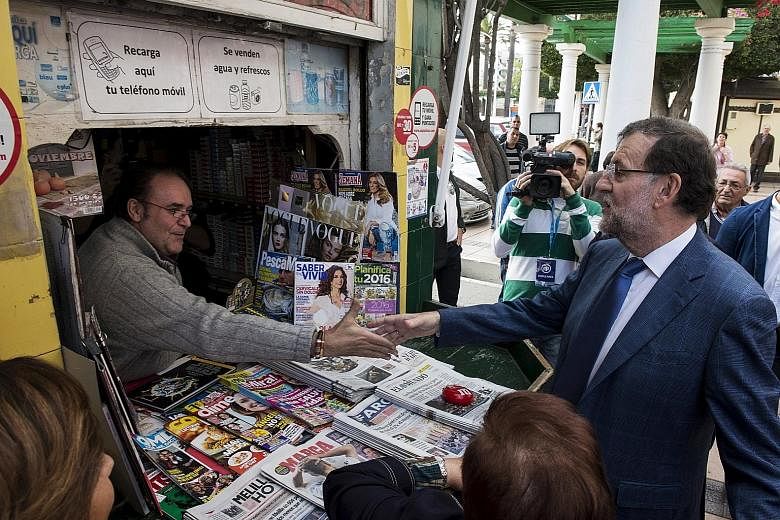MADRID • Spanish Prime Minister Mariano Rajoy has officially kicked off his campaign for re-election with the promise that his party "takes Spain seriously", ahead of tight legislative polls on Dec 20.
The head of the outgoing government faces three challengers who were unknown when he first took power in 2011: rising star Albert Rivera, 36, from the centrist Ciudadanos party; the Socialists' Pedro Sanchez, 43; and far-left Podemos candidate Pablo Iglesias, 37.
"We have 800,000 members," Mr Rajoy told supporters of his Popular Party (PP) in Madrid on Thursday night as he highlighted his experience and repeated the slogan, "We take Spain seriously."
"We are going to win these elections," the 60-year-old added, though analysts have predicted this could be the tightest nationwide vote the country has seen in decades.
The PP is extending its lead over rivals, according to a poll published on Thursday, with a projected 28.6 per cent of the vote, down from the 44.6 per cent it won at the last election. But the same poll found that 41 per cent of voters were still undecided.
The Socialists' Mr Sanchez also kicked off his campaign on Thursday with a high-octane rally in a hall near Madrid, where he played messages of support from a number of European leaders, including Italian Prime Minister Matteo Renzi.
Mr Rivera officially launched his bid in a Madrid hotel, with posters featuring his name and the message, "with hope".
The election is likely to expose fault lines between Spain's rural, older population - who largely favour the traditional parties - and younger urbanites who lean towards Podemos and Ciudadanos.
The Popular Party has been worn down by corruption scandals, austerity measures and an unemployment rate that is falling but still stands at 21.1 per cent, the highest in the euro zone with the exception of Greece.
There's one issue above all that Mr Rajoy is trying to avoid in the run-up to the election and Abengoa SA just put it back on the front pages: financial bailouts.
With the Seville-based renewable energy producer filing for protection from creditors a month before the polls open, unions and the leader of its home region are demanding a government rescue to protect about 7,000 Spanish workers.
That puts Mr Rajoy in a spot. Not only does he want to avoid handing voters' cash to a private company right before he asks them to elect him again, but his whole term has revolved around bailouts of one form or another. And his election strategy is to avoid discussing them.
"While a headline about job losses is the last that the PP would like to see, a headline about taxpayer money helping a private company is ammunition for the opposition," said political analyst Antonio Barroso at Teneo Intelligence in London.
AGENCE FRANCE PRESSE, BLOOMBERG

